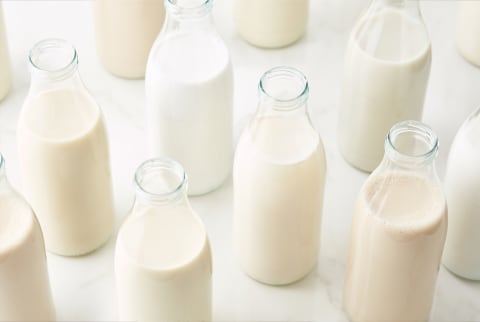Advertisement
The Best Alternative Milks For Blood Sugar + How To Choose, From An MD


It seems like the milk section at the supermarket is getting more and more expansive—especially with dairy-free alternatives. While oat, almond, and soy may be the most popular options for coffee shops, there's actually a plethora of other options, each with its own set of benefits.
However, some plant-based milks may actually be healthier than others when it comes to blood sugar balance. We recently sat down with blood sugar expert Lauren Kelley-Chew, M.D., physician and head of clinical product at Levels, on the mindbodygreen podcast, where she unveiled the unfortunate truth about some crowd-favorite plant-based milks. Here's what you should know.
What is the best alternative milk for blood sugar?
Here's the thing—when it comes to choosing the best alternative milk, it's not necessarily about which nut or seed you choose. Instead, Kelley-Chew says, "I look for milks that are unsweetened and have as few ingredients as possible." You'll want to keep an eye out for added oils (canola, vegetable, sunflower seed, etc.) and added sugars.
While a clean ingredient list should be the first priority, you can also find different benefits and drawbacks depending on the milk you choose. Sorry to say: Oat milk and rice milk are two alternatives Kelley-Chew tends to stay away from. Rice and oat milk are likely to cause a blood sugar spike, she says, and tend to come sweetened. What's more, these kinds of milk tend to have less protein than some other popular competitors.
Not sure which milk to choose instead? Here's a quick list of options that may be more blood sugar-friendly:
- Almond
- Coconut
- Flax
- Hemp
- Cashew
Summary
What about dairy?
The conversation around dairy milk and blood sugar is a bit more nuanced, Kelley-Chew says. While you may assume dairy has a lower insulin response, it's actually the opposite given the carb load. Further, "Dairy has the naturally occurring sugar lactose. So, even unsweetened dairy will have some sugar," Kelley-Chew says.
"On the flip side, there have been many studies showing that people who eat dairy, in general, have better signs of metabolic health," she explains. These competing narratives can get confusing, and ultimately, it's up to you to decide how much dairy milk your body can tolerate (if at all).
And remember, regardless of whether you opt for dairy, oat, almond, or another type of milk, the most important step is to check the ingredients for added sugars. The simpler the ingredient list, the better.
The takeaway.
While one alternative milk may not be better than the other, per se, some options like oat and rice milk may lead to a more dramatic sugar spike since they're generally lower in protein. Dairy also contains a natural sugar called lactose, which is why unsweetened alternatives like almond, cashew, hemp, and coconut milk are recommended for those looking to mitigate a glucose spike. Want to learn more ways to maintain healthy blood sugar? Check out this story.